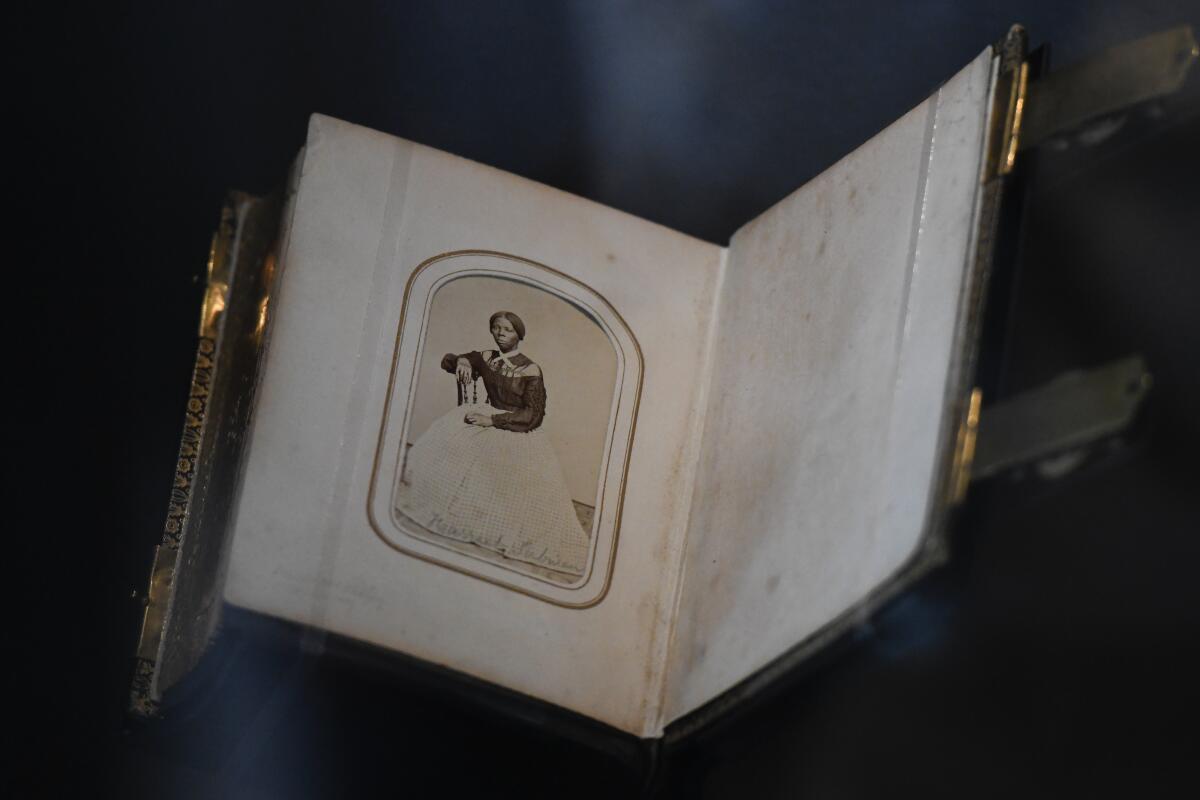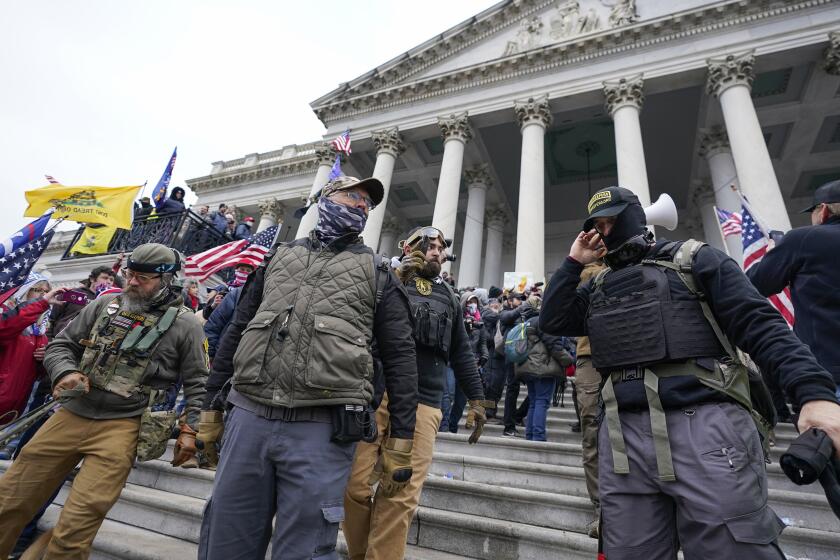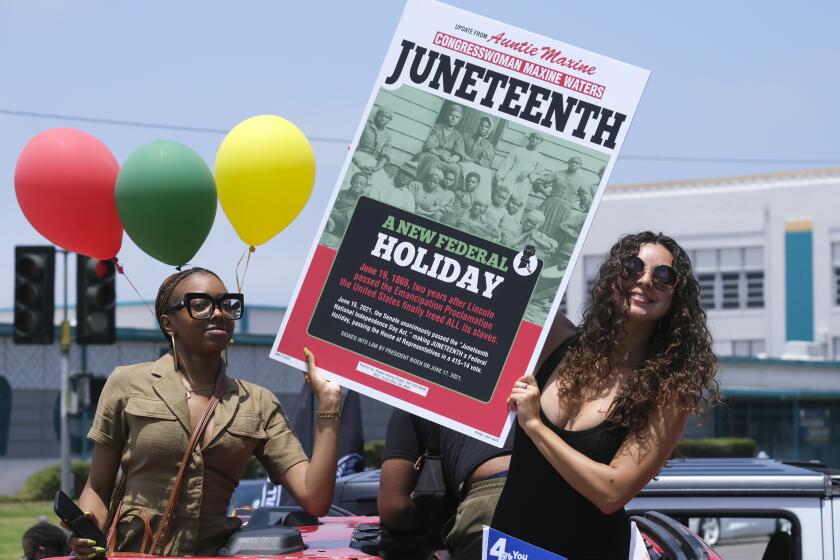Opinion: How Black Americans’ refusals of injustice have shaped our national story

- Share via
Refusal is a powerful political act. Acting in defense of themselves, Black people and Black women in particular have consistently refused the terms of oppression, discrimination and dehumanization. Refusal is a forceful no, packed full of energy and meaning. “We refuse” is similar to Black colloquialisms such as “nah,” “nope,” “not today, Satan” or my personal favorite: “Oh helllllllll no.”
Resistance is how one responds to white supremacy; refusal is why. In America, we tend to focus more on how resistance is manifested or performed. Not nearly enough emphasis is placed on why resistance is so crucial to the American story.
My great-grandmother Arnesta helps tell that story. In 1915, Arnesta was 9 years old in rural Alabama when she stepped on a rusty nail. Not long after, infection set in and Arnesta became very ill. She most likely suffered from tetanus, which can be deadly if untreated. Her mother, Mary, was frantic.
MAGA supporters’ attempts to rewrite Jan. 6 into a new American lost cause echo Confederate myths that Black educators challenged.
Mary took Arnesta to the only doctor she knew, a white man who lived in a big house on the other side of town. The doctor agreed to help Arnesta, but on one condition — that after he healed her, she would have to live in his home and work for his family for the rest of her life. Slavery had been abolished 50 years prior, yet the doctor felt entitled to Arnesta’s life and labor in perpetuity.
For a Black girl living during one of the worst periods of race relations in America, these were the detestable but sadly predictable terms of engagement. Built into the deal the doctor offered was a lifetime of servitude and perhaps worse — a far cry from the physician’s oath to “first do no harm.” Mary was panic-stricken. Not wanting to lose her daughter and only child to death, she agreed.
Thankfully, my great-great-great-grandmother, who was formerly enslaved, intervened. She refused the doctor’s unconscionable offer, picked up her ailing granddaughter and took her home. There, she administered every natural remedy at her disposal. Arnesta survived, but for the rest of her life she walked with a limp. This story to me has always summed up the power of white supremacy: Choose a life of bondage or refuse and limp. What has shaped me is not the doctor’s proposal but my ancestor’s refusal. Her response was not no, but never — a response that denied white supremacy its authority.
Refusal establishes boundaries and has defined unacceptable human interactions as those denying dignity, respect and decency. It is not apathy or cynicism, but an insistence on fully lived human experience. It is not forgoing one’s vote or checking out on the world. Refusal requires activism through traditional or creative methods, the kinds acknowledged and celebrated by LGBTQ+ communities in June, the month of Pride, and by Black Americans on Juneteenth, to champion freedom for everyone.
It’s impossible to celebrate a national holiday that marks the emancipation of Black people in 1865 without considering the role of education in freedom, which the GOP continues to attack today.
Such activism has created countless programs that fed, educated, healed and cared for Black communities. Many pivotal steps to end slavery were acts of refusal: The Underground Railroad was created because abolitionists refused to be complicit in oppression and abuse. Black leaders and white allies formed protection societies and published newspapers, pamphlets and personal narratives to set an abolitionist national agenda based on intellectual, rhetorical, political and physical refusal. When some 250,000 Black soldiers fought during the Civil War, they were refusing slavery on American soil.
In a similar spirit, during the 1960s and ’70s, the Black Panther Party refused second-class citizenship, creating national breakfast programs, health clinics, ambulance services, legal aid, schools and care programs to reject the void of public services available to Black Americans. In a period of racial and political unrest, the Black Power movement centered on joy and solidarity, invoking hope, happiness and kinship as a shield against the demoralizing and degenerative effects of racism. James Brown’s “Say It Loud, I’m Black and I’m Proud” was a refusal to let white supremacy determine what is beautiful, inspirational or good.
Although it can be enacted by an individual, at its heart, refusal is collective. That’s why the sentiment behind the phrase “we refuse” persists among subjugated people. It has been a key refrain in Black feminist and Native American politics, reiterating that oppressed people can and should refuse to be made invisible, silenced or denied. From the slave ships coming to the New World, through slavery, segregation and persistent structural racism, Black people have always fought back.
And Black culture refuses to be defined by oppression. Refusal has been our anthem, a way of being, present in the novelty and genius of our vernacular, in the newspapers and literature we created to tell our stories in the face of attempts to deny us literacy. It’s present in the drum, banjo and bass permeating our music that refuses to be replicated or erased, in the vocals that refuse to be timid or diluted. It is even present in our traditions of forgiveness and hospitality in societies that are often unwelcoming to us.
The revolutionary culture, art and community that have grown from these traditions are proof that like my ancestors, we can carve out a new trail and reject the choice between life in bondage or a limp. Now and forever, we can refuse and insist on creating our own destinies.
Kellie Carter Jackson is chair of Africana studies at Wellesley College and author of “We Refuse: A Forceful History of Black Resistance,” from which this piece is adapted. On X/Twitter: @kcarterjackson
More to Read
A cure for the common opinion
Get thought-provoking perspectives with our weekly newsletter.
You may occasionally receive promotional content from the Los Angeles Times.












